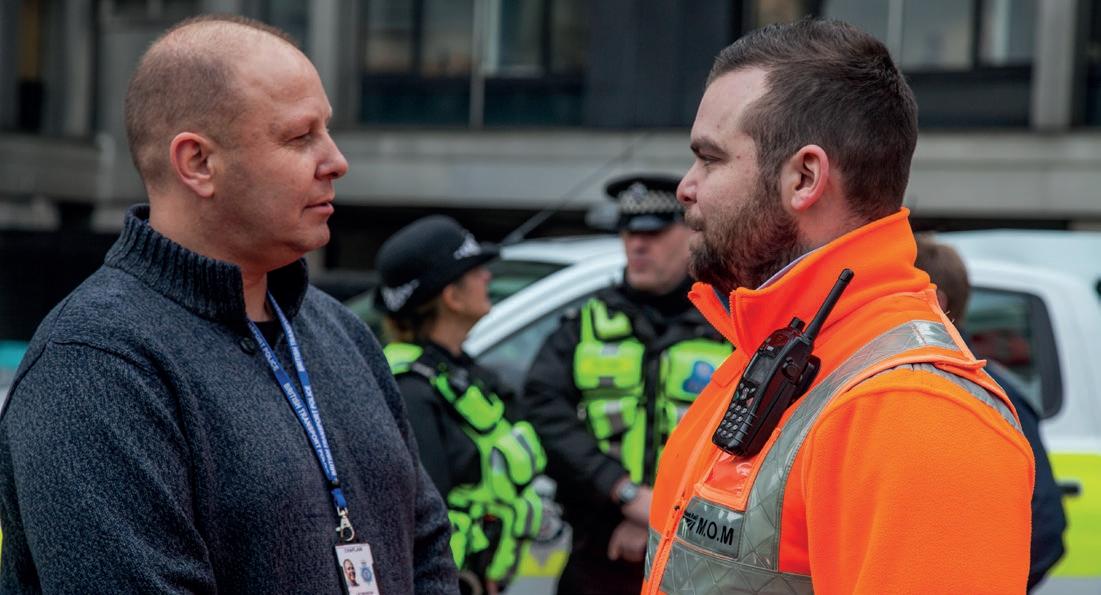
4 minute read
RAILWAY MISSION’S LIAM JOHNSTON EXPLAINS WHY ENGINEERING COMPANIES SHOULD INVEST IN THE MENTAL HEALTH OF THEIR STAFF
It is said that there are three types of people, there is the ‘glass half empty or a glass half full, type of person, then there are the engineers who point out that we have the wrong size of glass.’ While this is a slightly humorous take on an old saying, there is perhaps more than a grain of truth in the statement.

Advertisement
Engineering can be a demanding profession that often requires long hours with high levels of stress. Being focused on meeting deadlines, working on complex projects, and solving technical problems, can leave little time or energy for engineers to prioritise their own mental health and well-being.
The nature of engineering work often involves dealing with technical problems and solutions, which may make it easier for engineers to overlook the importance of emotional intelligence and empathy. Senior managers may be more comfortable working with machines and systems rather than people and emotions, which can lead to a lack of awareness and understanding of mental health issues.
Sadly, mental health is still stigmatised and seeking help is often seen as a sign of weakness. Many feel pressure to appear strong and capable at all times, and admitting to struggling with mental health could be perceived as a failure or a hindrance to their career.

It is important to note, however, that good mental health is crucial to overall well-being and productivity, and addressing mental health issues can actually improve performance and job satisfaction. Encouraging open dialogue about mental health and promoting mental health resources and support can help to break down stigma and create a healthier workplace culture for all. The best time to start having this open dialogue is day one of a person joining a company, but if that hasn’t happened, then the next best day to start a dialogue is today.
Talking can be a powerful tool for people suffering from stress because it can help individuals process and manage their emotions, gain perspective, and find solutions to their problems.
A Safe And Supportive Space
When someone is experiencing stress, they may feel overwhelmed and stuck in their thoughts and emotions. Talking to a trusted friend, family member, mental health professional, or one of the Railway Mission’s chaplains can provide a safe and supportive space to explore and express these feelings. Verbalising emotions and thoughts can help to release pent-up tension and provide a sense of relief.
Talking can also help individuals gain a new perspective on their situation. By sharing their experiences with someone else, they may be able to see their situation from a different angle and gain insights they had not previously considered. This new perspective can provide a sense of clarity and help the individual better understand their own emotions and reactions.
Talking with someone, like a chaplain, can help individuals find and explore practical solutions to their problems. By sharing their concerns with someone else, they may be able to explore ideas and come up with strategies to cope with stressors and manage their stress in a healthier way.
It is widely accepted that a company that prioritises mental health and well-being, creates a positive and supportive culture that values employee health and safety. This, in turn, can increase employee loyalty and attract the most talented people to the company.
Engineering companies should invest in the mental health and wellbeing of their staff for several reasons. By investing in mental health, employees who feel supported and valued by their employer are more likely to be satisfied with their job and remain with the company for longer. This can lead to increased productivity and reduced turnover costs, by improving morale, reducing absenteeism, and leading to more innovative and effective problemsolving.
Of course, employers have a legal and ethical responsibility to provide a safe and healthy workplace for their employees. This must include addressing mental health concerns and providing support for employees who may be struggling. But there are wider social and societal benefits to improving mental health engagement; companies that prioritise the mental health and well-being of their employees can have a positive impact on society as a whole, by reducing the stigma around mental health and setting an example for other employers to follow.
YOUR WELL-BEING TOOLKIT
Railway Mission has a good working relationship with Network Rail, Train Operators and British Transport Police. But as an industrial chaplaincy, it is right to encourage a wider engagement within the Railway Industry Association member companies, as we can be an important part of your company’s well-being toolkit.

Railway Mission chaplains provide spiritual and emotional support to employees regardless of their religious beliefs. This can include listening, offering guidance, and providing a safe and confidential space to discuss personal or workrelated issues.
Chaplains can help resolve conflicts in the workplace by mediating between employees and offering a neutral perspective on the situation, helping to reduce stress and improve communication between colleagues.
In times of crisis, such as accidents or fatalities in the workplace, chaplains can provide emotional and spiritual support to employees and their families. This can help to reduce the impact of the crisis on employees’ mental health and wellbeing. Following a fatal accident at Gatwick Railway Station, Gavin Bye, Costain Group Safety, Health and Environment Director, recently wrote to Railway Mission to say, “the Chaplain’s support in the aftermath of the incident received amazing feedback from the team and was particularly appreciated as we were struggling to get our employee assistance provider to mobilise in the way we expected them to.”
By including industrial chaplaincy in their well-being toolkit, engineering companies demonstrate a commitment to the well-being of their employees and create a positive workplace culture that values employee mental health, as well as mental and spiritual well-being.
Railway Mission chaplaincy doesn’t replace the company’s chain of care, but it is complementary to other well-being initiatives, such as employee assistance programmes and mental health resources. Chaplains can work with these initiatives to provide a holistic approach to employee well-being.

In summary, the Railway Mission’s industrial chaplaincy service can provide spiritual and emotional support, assist with conflict resolution, crisis management, and workplace culture improvement, as well as work in collaboration with other well-being initiatives. By including chaplaincy in their well-being toolkit, Railway Industry Association companies can demonstrate a commitment to the well-being of their employees and create a more supportive and caring workplace culture.
Chris Gibb while Managing Director of Virgin Cross Country Trains, said of the financial support the company provided to the Railway Mission chaplaincy, “I see this contribution as part of our insurance policy.” This was because having a confidential, independent and impartial support network that has the agility to respond quickly is so important in today’s high-pressure world. The chaplaincy may not be able to visit your company or staff regularly, but we are there for you and your team when you call; because even if your company doesn’t support our chaplains financially, our chaplains will still support you, because people are important.
Liam Johnston is Executive Director of Railway Mission.
Mark Phillips










